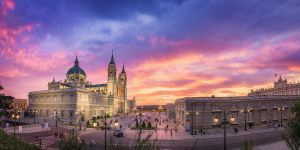Santos por Madrid. The phrase, although simple, is not easily translatable. There’s a pun in it. It can be translated as Saints For Madrid, or as Saints (wandering) around Madrid – as in andar por ahí, to “wander around,” to “walk around.” This is the name that some organizations in the Archdiocese of Madrid decided to use for a new pilgrimage route that covers the places where nine beloved Spanish saints are buried – all of them in Madrid.
Of course having that many saints buried in or linked to one city is an experience unique to Europe (and possibly Mexico), though the idea of a pilgrimage close to home is something that is being replicated creatively even in the United States, such as the way this family did it.
As explained in the note published by COPE, the Archbishop of Madrid, Cardinal José Cobo, visited some of the tombs of the saints that make up this route last November 4, marking the inauguration of this local pilgrimage trail. As pilgrims visit the burial sites of these saints, they get acquainted with the different particularities (that is, the specific charisms) of the communities these saints either founded or belonged to. It’s called Ruta de la Santidad – Spanish for “Route of Holiness” or “of Sanctity.”
The route is comprised of nine places – all of them burial sites within the diocese of Madrid.
Some of these saints are, naturally, better known than others. The route begins at the burial site of the patron saints of the city, St. Isidro Labrador (Isidore the Farmer) and his wife, St. María de la Cabeza. From then, the route moves on to the tombs of St. Carmen Sallés, St. Vicenta María López Vicuña, St. Soledad Torres Acosta, St. José María Rubio, St. Alonso de Orozco, St. Francisco de Borja and, last but not least, St. Pedro Poveda and his martyred companions.
Why a pilgrimage? And why Madrid?
Embarking on a pilgrimage always implies going on a unique journey – even if one has walked the very same camino more than once. It is not just a physical trek (which it clearly is) but also a profound inner exploration. It offers us a chance to reflect, renew, and find a deeper dimension to one’s life, one that transcends the seemingly endless repetition of the everyday.
Madrid, a city steeped in Catholic heritage, holds a special charm for pilgrims. Its historical churches, like the Almudena Cathedral and the Church of Saint Jerome the Royal, aren’t just architectural marvels. These are places that echo centuries of faith, tradition, and devotion, fostering a deeper, better, clearer understanding of the spirituality one has inherited.
The appeal of Madrid for pilgrims lies not just in its religious history. This route offers pilgrims the possibility to get to know the lives of these venerable men and women – men and women who helped shape Christianity itself.
By so doing, pilgrims can discover (or re-discover) their own charisms, their own calling. These solemn burial sites offer those seeking a moment of respite from the hustle and bustle the possibility of finding a new connection with their own walks of life, illuminated by the exemplar lives of these saints.



